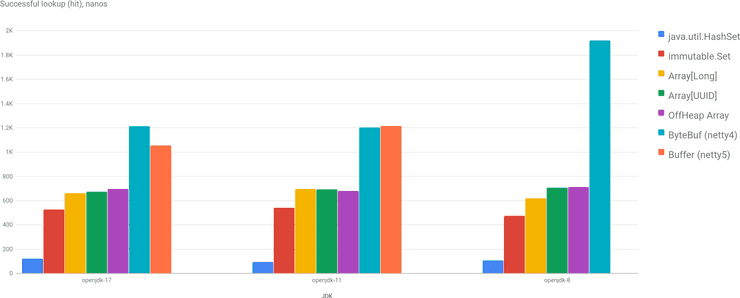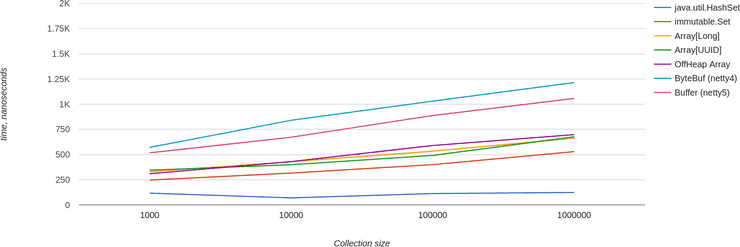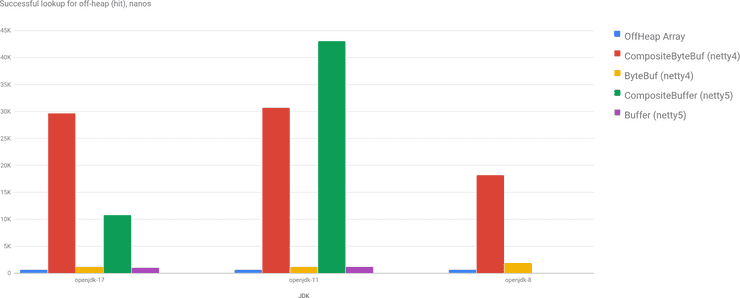This post is not about a Magical Solution that I found or some performances issues in JDK or in Scala. Here I want to describe my findings around a particular aspect of an application that I write. I hope you’ll find something useful in this post, but don’t expect any recipes.
A simplified use case in an application: on startup an application downloads a cache and then periodically updates it. The simplest example of a cache is a Set of UUIDs. First, I thought about optimizing it via using different implementations of Set, you may check out my post about it (spoiler alert: java.util.HashSet is very good comparing to scala.collection.immutable.Set).
What to optimize next?
Memory
The memory layout for UUID is simple: an object itself + 16 bytes (2 long fields). Object size on 64-bit architecture is 16 bytes: 12 bytes header + 4 bytes for alignment (according to jol). So, every UUID object occupies 32 bytes in heap.
The layout for HashSet is more complicated, but in essence it’s a wrapper for an array of Node class which has a reference to a key object. Roughly, it’s something like x4 of the payload. If you have a million of such UUIDs it could be a concern. Or maybe not - who cares, we are in JVM, right? :)
Until Project Valhalla is not done, especially JEP-401 part of it, if we want to make memory more manageable, we need to do tricks.
The only trick in JVM is to use arrays, as an array is always contiguous in memory. Meaning, that if we will create an array of long of 2x size, then we will get enough memory to store an array of UUID. How does it help us? Well, instead of using HashSet we could sort an array of UUID and then use binary search to determine if an array contains a UUID.
Simply put:
UUID[] array = ...;
Arrays.sort(array);
public boolean contains(UUID key) {
int found = Arrays.binarySearch(array, key);
return found >= 0 && found < array.length;
}Of course, UUID[] doesn’t do much for us, a it still has 2x overhead of UUID object.
int size = array.length;
long[] bits = new long[size * 2];
int index = 0;
array.forEach(uuid -> {
bits[index++] = uuid.getMostSignificantBits();
bits[index++] = uuid.getLeastSignificantBits();
});
// Here we need to borrow implementation from Arrays.binarySearch class.
public contains(UUID key) {
int low = 0;
int high = size - 1;
while (low <= high) {
int mid = (low + high) >>> 1;
int current = 2 * mid;
long mostBits = bits[current];
if (mostBits < key.getMostSignificantBits())
low = mid + 1;
else if (mostBits > key.getMostSignificantBits())
high = mid - 1;
else {
long leastBits = bits[current + 1];
if (leastBits < key.getLeastSignificantBits())
low = mid + 1;
else if (leastBits > key.getLeastSignificantBits())
high = mid - 1;
else
return true;
}
}
return false;
}In this solution we use almost exactly bytes in heap as we need (with only small array overhead).
Going Off-Heap
Why off-heap? To say the truth - just for fun. I wouldn’t put anything of this sort in production without an actual necessity. However, why not to investigate this possibility as well from the performance perspective?
To fetch the cache I use an HTTP client based on netty. In netty you may use off-heap memory for internal buffers etc. Which means that we can even obtain a cache with zero-copy!
Basically, instead of having long[] we need to allocate memory directly via Unsafe or via netty’s API: ByteBuf and Allocator. All the code you may find here.
What is zero-copy for netty? Basically, from netty you get response body in a series of ByteBuf instances that contain references to off-heap allocated memory with the chunk of the data. What you can do is to create a CompositeByteBuf and add all chunks to this composite buffer (if cache-server responds with already sorted, prepared data), then you don’t need to copy those chunks and just reuse it.
Benchmarks!
And now it’s time to benchmark all the proposed solutions and to find out, what’s best in terms of performance!
Disclaimer: beware of the micro-benchmark results.
At the end I decided to include benchmarks for java.util.Set and scala.collection.immutable.Set as a reference and a kind of baseline. Then we have 2 implementations based on Java Array: array of UUID (just for the reference) and array of long (as a memory optimization). And then we have benchmarks for off-heap array implementation based on Unsafe class, ByteBuf implementation from netty v4 (4.1.79.Final) and Buffer implementation from netty v5 alpha version (5.0.0.Alpha4).
Lookup performance in 3 JDKs
Here is a successful lookup (hit, contains returns true) performance in a collection of 1 million UUIDs. As you may see, HashSet is a clear leader, but this is not a surprise. Scala’s Set performance is very close to binary search. Performance of off-heap array is very close to on-heap implementations, long[] is slightly better.
Lookup performance for different Set size
Also, nothing unexpected here. Performance of HashSet doesn’t depend on the collection size, performance of all other implementations degrades logarithmically.
Off-Heap Performance
I excluded benchmarks of CompositeByteBuf and CompositeBuffer, because, as you may see, its performance is awful. Actually, it’s not a surprise if you think about it. The way I composed it in test is splitting all data in chunks of 4000 bytes and adding it to a composite buffer to simulate packets in the real network. For each lookup by index CompositeByteBuf should iterate over all buffers to find the relevant chunk… So, zero-copy has its huge cost :)
Conclusion
It was a fun exercise for me. There is always a trade-off between memory and CPU usage, and this benchmark shows it well. I guess it’s possible to build something fine-tuned tailored to UUID, but I’d prefer to wait for the Valhalla :)
The overhead of ByteBuf comparing to direct use of Unsafe is surprising. Though, it improved since jdk8, but still it’s like one third slower. Custom binary search over array of long does slightly better, which is actually very cool to see.
I’d say if memory is not an important concern for you, there is no need to replace HashSet with long[]. 4x in memory usage compensate well with 6x performance. And with Valhalla Project memory usage eventually will go down as well. At least one might hope.
Play with charts here. Source code is on GitHub. Originally posted on Medium. Cover image by geralt from Pixabay.


